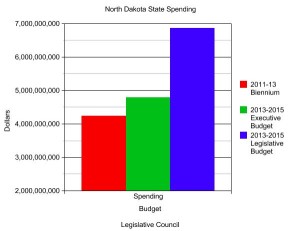Can North Dakota afford to slow down the oil boom?

By Rob Port | Watchdog.org North Dakota Bureau
SPENDING BOOM: North Dakota’s budget has increased more than 62 percent in the 2013-2015 biennium compared to the previous period.
BISMARCK, N.D. — Dr. Lyle Best is a chemist who lives near Watford City in the heart of North Dakota’s booming oil country. At a recent public hearing held by the North Dakota Industrial Commission, which regulates oil activity, Best called for a slower pace of oil and gas development to address flaring and other issues.
“Some mild restrictions on this activity would go a long way toward improving a host of problems related to oil development, not the least of which is gas flaring,” Best said, according to the Associated Press.
The question is, What sort of restrictions on oil and gas development can the state afford to implement?
Revenue from oil and gas development have had a profound effect on the state’s finances.
In 2013, more than half of all tax revenue collected by the state’s tax commissioner were from oil and gas development, and that’s not counting energy development’s impact on other revenue streams, such as sales and income taxes. North Dakota has led the nation in personal income growth six of the past seven years. According to the latest data from the state’s Office of Management and Budget, personal income tax collections are up more than 30 percent.
But that money is being spent as quickly as it comes in. North Dakota’s part-time Legislature meets once every two years. They set a two-year biennium budget that spends revenue projected to come in. In 2013 the Legislature increased the biennium budget by more than 62 percent, increasing spending from just more than $4 billion in the previous biennium to nearly $7 billion in for 2013-15.
That includes aggressive spending on schools, roads, water projects and other infrastructure.
So the question, for those who would slow down the oil boom, is how the state would go about replacing the lost revenue.
You can reach Rob Port at rport@watchdog.org







